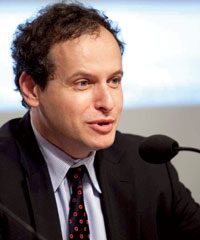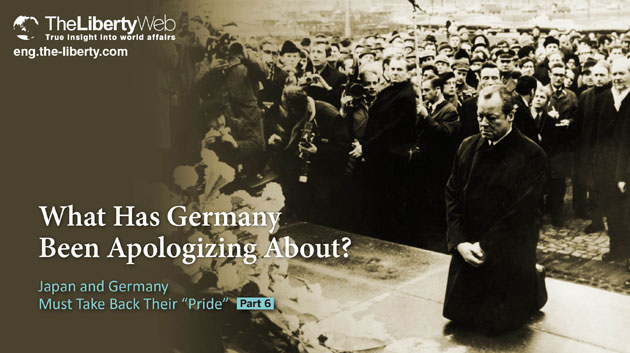What Has Germany Been Apologizing About?
Japan and Germany, as nations that lost in WWII, still are asked to express regret and apologize. While there will always be regret with war, the fact that the third and fourth largest economic powers in the world cannot become permanent members of the Security Council of the United Nations begs examination. Surely it cannot still be that they were the “losing nations” in the War. Must both nations continue to apologize forever? At what point are the apologies of the past accepted and the accomplishments of seventy years of peace and partnership with the world community acknowledged?
Japan Ought to Apologize to Korea to Advance Cooperation Between Japan, America, and Korea
An Interview with Thomas U. Berger

Political scientist,
Thomas U. Berger
Born 1962, Connecticut, United States. 1992, received his Ph.D. at MIT. Dr. Berger is Associate professor at the international relations department in Boston University.
photo: Wilson Center

On the left is (then) Prime Minister Tomiichi Murayama who announced the “Murayama Discourse” in 1995 that apologized for “Japan’s colonial rule and invasion”. On the right in 1970 Chancellor Willy Brandt of East Germany, is shown kneeling before the Jewish massacre memorial to give flowers in Warsaw, capital of Poland.
Photo: Reuters/Aflo Photo: Aflo
How do Westerners generally think about the historical problem of Japan? We asked Thomas Berger, associate professor in the Department of International Relations at Boston University, an author who has researched the historical problems of post-war Japan and Germany, and was selected for the Foreign Affairs’, “Best Book of 2013″.
— Do you think Japan’s apology is enough?
Berger (hereafter, B): We can say that Japan has apologized if we consider how Japan’s politicians have made their statements through such things as the Murayama Discourse. However, what is important is whether reconciliation with neighboring countries has advanced.
Japan’s problem is that Japan has become tired of apologizing, and stopped apologizing. However, its neighboring countries have problems as well. China and Korea are not exactly cooperative.
— How is it when compared to Germany?
B: To compare the situation to Germany may be misleading. Germany has succeeded in apologizing, but that is because neighboring countries of Germany has accepted their apology, and wanted to progress with reconciliation. Germany had advanced their compensation programs from very early on for the atrocities committed by the Nazis, such as paying 10 billion dollars in compensation fee.
Japan has a number of programs such as the fund for helping former comfort women, but had not taken much initiative and some were even cancelled. Japan has not done anything. Especially concerning Korea, to advance cooperation between Japan, the United States and Korea, such programs need to be brought back.
The Number Involved in the Massacre Is Political
— Do you believe that 200,000 Korean women were abducted by the Japanese army and were forced to become comfort women?
B: I’m not a historian, so I don’t discuss historical documents. I understand that there is not enough material. However, it is clear that the Japanese government were significantly involved. There were prostitutes and women who were forced to be sex slaves. Quite awful.
— How about the Nanking Massacre?
B: A problem with the Nanking incident is that the Chinese soldiers who realized that they had lost shed their uniforms and mixed in with the civilian population. For that reason, civilians were met with violence and were massacred.
However, we do not know how many people exactly were killed. If “300,000 Chinese were killed in Nanking by the Japanese,” that would go against the historical fact, and would have to be considered propaganda by China. Whatever the numbers, Japan’s brutality is clear.
However, by looking at only the negative aspects of Japanese history, it provides a barrier to a healthy patriotism. In this sense, it is necessary to understand Prime Minister Abe’s patriotism to some degree.
To Negate the Tokyo Trial Would Be to Negate International Norms
— After the war, the Tokyo Trial was held to judge Japan’s leaders. What do you think about this?
B: There were problems with the Tokyo Trial, like how the Japanese army’s leaders were judged when there was no legal precedence. If Japan should be accused of involving civilians in war, then the American military could be accused of crime too for their air raids and atomic bombings on Japanese cities.
The thing is, the rulings at the Tokyo Trial are the source of current international norms. For this reason, when Prime Minister Abe visits the Yasukuni Shrine where those who were found guilty at the Tokyo Trial are enshrined, it goes against international norms, and produces many problems.
Related
- Next year is the 70th anniversary since the end of the war: Japan and Germany Must Take Back Their “Pride” (Part 1)
- Was Japan an Evil Nation? : Japan and Germany Must Take Back Their "Pride" (Part 2)
- An Analysis of the Starting Point: Japan and Germany Must Take Back Their "Pride" (Part 3)
- The Americans and Chinese Created"The Rape of Nanking", Spread Their Lies, and Falsified the Story Surrounding the "Nanking Incident", Which Made News Worldwide as a "Massacre": Japan and Germany Must Take Back Their "Pride" (Part 4)
- Japan Must Be Freed and Cleared of the Accusations Regarding Its WW2 Conduct :



















